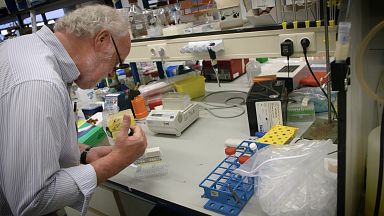In this episode of Futuris the team examine what Europe is doing to boost funding for research and innovation in the fight against COVID-19.
In this episode of Futuris the team examine what Europe is doing to boost funding for research and innovation in the fight against COVID-19.
At the University of Copenhagen researchers are working on a candidate vaccine with what is known as "recombinant technology". It involves cloning Coronavirus genes to identify and isolate proteins in order to understand how they bind to human cell receptors.
"The idea is to generate antibodies that hinder the virus penetrating into human cells. Right now we are testing prototype vaccines in mice. Those serums will be sent to Holland, where we will test the antibodies. The timelines are very aggressive in this project," says Morten Acertoug Nielsen, Associate Professor of Immunology and Microbiology, at the University of Copenhagen.
The European funded project is just one of many currently underway in Europe in the fight against the coronavirus.
Europe a leader in global effort
Working closely with the World Health Organization, the European Union has been coordinating a so-called pledging conference to tackle the pandemic.
Focused on improving diagnosis, treatment and prevention, the conference aims to make sure that any new medical technology, developed both during and after the pandemic, is made available to all.
During the pledging Conference, the European Commission announced one billion euros for research into COVID-19 through its flagship Horizon 2020 programme. The extra funding includes 450 million euros for treatment, diagnostics and prevention; 400 million euros for R&D and production facilities and an additional 150 million euros for further innovation. In addition to enabling a greater understanding of the virus, so as to prepare and respond better to outbreaks, the money will also go towards treatment and vaccines.
"We have 48 projects which are up and running, on testing, preventing, treating, which allow 159 teams in Europe, in fact, to come together. Part of the effort is also investment into clinical trials. We are funding clinical trials for therapies. At the same time, we are also working quite closely with industry. We have an existing partnership called "Innovative Medicines Initiative". This partnership with the pharmaceutical industry is now of course looking into COVID," explains Jean-Eric Paquet, Director-General of DG Research & Innovation at the European Commission.
"What we are also providing is a platform around the European Open Science Cloud to allow researchers to share their research results, but also to share the data of those results. And this is increasingly taking up, and this I think will also very much help to bring together the more global efforts around the Science against COVID-19," he adds.
The race to find antibodies
In Rotterdam researchers taking part in another European funded project are studying to see if antibodies offer sufficient protection against the virus. They say they are confident their research will eventually result in multiple strategies to fight COVID-19.
"We can use the antibodies for diagnostics. That's number one. Number two would be to use the antibodies as a prophylactic, so give them to people who are at risk of infection, so that they don't get infected. And number three would be to use it as a therapeutic to treat patients who have been infected," says Franck Grosveld, a cell biologist at the Erasmus University Medical Center.












